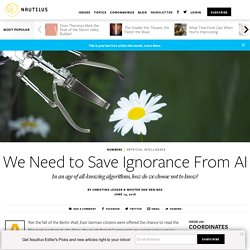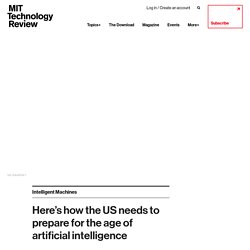

AI Gaydar and Other Stories of the Death of Ignorance. After the fall of the Berlin Wall, East German citizens were offered the chance to read the files kept on them by the Stasi, the much-feared Communist-era secret police service.

To date, it is estimated that only 10 percent have taken the opportunity. In 2007, James Watson, the co-discoverer of the structure of DNA, asked that he not be given any information about his APOE gene, one allele of which is a known risk factor for Alzheimer’s disease. Most people tell pollsters that, given the choice, they would prefer not to know the date of their own death—or even the future dates of happy events. Each of these is an example of willful ignorance. Socrates may have made the case that the unexamined life is not worth living, and Hobbes may have argued that curiosity is mankind’s primary passion, but many of our oldest stories actually describe the dangers of knowing too much. AI can find patterns and make inferences using relatively little data.
Who should decide on these tradeoffs? References. Prc brief 2 11 brayne policing. 794 AI Ethics paper FA.
Bringing a conscience to machines - the ethics of AI The rise of the machine raises profound ethical questions for society, the business community and the accounting profession. IN BRIEF Artificial intelligence is revolutionising our world but not necessarily helping us flourish as human beings AI brings with it a range of ethical considerations that should not be left to the tech giants to decide The accounting profession has a role to play in shaping how AI is integrated into businesses in a socially responsible way Artificial Intelligence (AI) is impacting society and civilisation in ways mankind never thought possible. But is it helping us to evolve and flourish as human beings? A recent paper by Chartered Accountants Australia and New Zealand entitled Machines can learn, but what will we teach them? offers a timely warning that we are at an ethical crossroads where decisions need to be made about how AI will shape our shared futures. From smart phones to smart cars, AI has invaded every aspect of our lives, but the hottest field of AI right now is machine learning – the notion of using statistical techniques to help systems learn from data. It’s an area gaining attention because of the extraordinary potential to develop systems with learning capabilities close to those of the human brain. While most people accept AI because it can make our lives easier and our businesses more productive, these technologies come with potential downsides. These include risks to personal privacy, data security and the potential for social re-engineering regarding how we relate to each other. However, the greater risks could lie around the corner. The rapid progress being achieved in AI means that super intelligent machines are now seen as the next development stage, where machines will learn to write code for themselves and possibly become independent of programmers. It would mean intelligence without a human conscience, not guided by human virtues of courage, generosity, empathy and compassion that are not easily replicated by an algorithm. It may all sound very “Terminator” but the fact is, there is real potential for AI to totally reshape our existing social landscapes as well as our economic order. This brings serious ethical challenges that should not be left to the technology giants alone to resolve. The accounting profession can play a positive role The growing range of AI services and products means that individuals need to better understand how AI is impacting upon them. The rise of fake news created by bots and its distribution, along with hate speech, on platforms such as YouTube, Twitter, Facebook and Instagram has shown how technological advances can undermine the foundations of democracy. The Cambridge Analytica data scandal was a wake-up call to humanity and, for the first time, we collectively asked: “How much do the machines know about me?” In the commercial world, it is essential for businesses and other organisations to have an AI ethics code or refreshed governance protocols to outline what the machine is expected to do as well as its limitations. Ideally these should be shared with customers, so they can make informed choices about who they are doing business with. At the regulatory level, there are concerns about the possibility of “forum shopping”, with some Japanese companies’ already offshoring activities to the USA, where standards around data privacy are lower. The accounting profession is able to play a positive role in shaping how AI is integrated into business. As trusted advisors, accountants can help business leaders embrace and embed AI in socially responsible ways. The profession can help build consensus around AI industry standards for design, auditing and transparency as well as identifying techniques to build public trust in new technologies. Artificial intelligence augments our abilities, enabling us to achieve greater efficiencies and higher levels of performance. However, it is also changing us in ways we are not fully aware of. We need to tune our ethical antenna to ensure we take the right road at the right time. Failing to build an ethical dimension into each stage of our AI journey, could bring serious consequences that prove difficult to reverse. – barbaragrieve
MGI Artificial Intelligence Discussion paper. Artificial intelligence: The next digital frontier. Facebook's artificial intelligence robots shut down after they start talking to each other in their own language. Facebook abandoned an experiment after two artificially intelligent programs appeared to be chatting to each other in a strange language only they understood. The two chatbots came to create their own changes to English that made it easier for them to work – but which remained mysterious to the humans that supposedly look after them.
The bizarre discussions came as Facebook challenged its chatbots to try and negotiate with each other over a trade, attempting to swap hats, balls and books, each of which were given a certain value. AI Shaping A Future New Zealand Report 2018. Reports and Publications - AI Forum. Here’s how the US needs to prepare for the age of artificial intelligence. Politicians worldwide are stealing one of the US government’s best ideas by drawing up ambitious plans to make the most of advances in artificial intelligence.

These AI manifestos, penned in Paris, Beijing, and elsewhere, follow the example of the Obama administration, which released a report on the technology toward the end of its tenure. This report did not include funding, but it made it clear that AI should be a key focus of government strategy. The Trump administration has abandoned this vision and has no intention of devising its own AI plan, say those working there. They say there is no need for an AI moonshot, and that minimizing government interference is the best way to make sure the technology flourishes. That looks like a huge mistake.